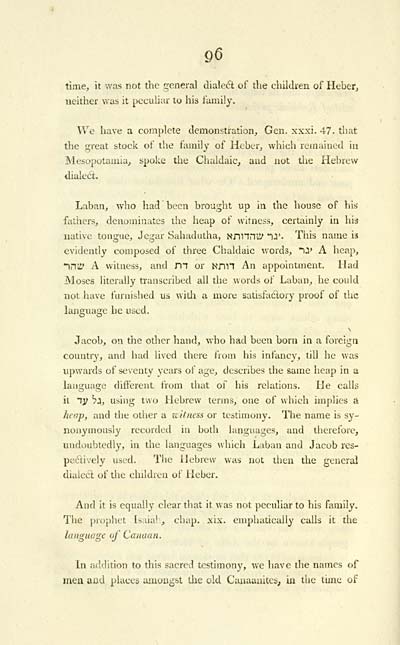Blair Collection > Celtic researches, on the origin, traditions & language, of the ancient Britons
(186)
Download files
Complete book:
Individual page:
Thumbnail gallery: Grid view | List view

90
time, it was not the general dialed of the children of Heber,
neither was it peculiar to his family.
AVe have a complete demonstration. Gen. xxxi. 47. that
the great stock of the family of Heber, which remained in
Mesopotamia, spoke the Chaldaic, aud not the Hebrew
tlialect.
Laban, %vho had been brought up in the house of hiá
fattiers, denominates the heap of witness, certainly in his
native tongue, Jegar Sahadutha, Νπηπίν nj'. This name is
evidently composed of three Chaldaic words, ί:ι> A heap,
"in::' A witness, and m or κηη An appointment. Had
Moses literally ti'anscribed all the words of Laban, he coidd
not have furnished us with a more satisfadlory proof of the
language he used.
Jacob, on the other hand, who had been born in a foreign
country, and had lived there from his infancy, till he was
upwards of seventy years of age, describes the same heap in a
language different from that of his relations. He calls
it lÿ bi, using two Hebrew terms, one of which implies a
heap, and the other a zcifness or testimony. The name is sy-
nonymously recorded in both languages, and therefore,
undoubtedly, in the languages which Luban and Jacob res-
pedively used. The Hebrew was not then the general
dialecl of the children of Heber.
And it is equally clear that it w as not peculiar to his family.
The prophet Isaia! , chap. x'lx. emphatically calls it the
language of Canaan.
In addition to this sacred testimon^^ we have the names of
men aud places aiuougst the old Cauaanitcs, in the tijne of
time, it was not the general dialed of the children of Heber,
neither was it peculiar to his family.
AVe have a complete demonstration. Gen. xxxi. 47. that
the great stock of the family of Heber, which remained in
Mesopotamia, spoke the Chaldaic, aud not the Hebrew
tlialect.
Laban, %vho had been brought up in the house of hiá
fattiers, denominates the heap of witness, certainly in his
native tongue, Jegar Sahadutha, Νπηπίν nj'. This name is
evidently composed of three Chaldaic words, ί:ι> A heap,
"in::' A witness, and m or κηη An appointment. Had
Moses literally ti'anscribed all the words of Laban, he coidd
not have furnished us with a more satisfadlory proof of the
language he used.
Jacob, on the other hand, who had been born in a foreign
country, and had lived there from his infancy, till he was
upwards of seventy years of age, describes the same heap in a
language different from that of his relations. He calls
it lÿ bi, using two Hebrew terms, one of which implies a
heap, and the other a zcifness or testimony. The name is sy-
nonymously recorded in both languages, and therefore,
undoubtedly, in the languages which Luban and Jacob res-
pedively used. The Hebrew was not then the general
dialecl of the children of Heber.
And it is equally clear that it w as not peculiar to his family.
The prophet Isaia! , chap. x'lx. emphatically calls it the
language of Canaan.
In addition to this sacred testimon^^ we have the names of
men aud places aiuougst the old Cauaanitcs, in the tijne of
Set display mode to: Large image | Transcription
Images and transcriptions on this page, including medium image downloads, may be used under the Creative Commons Attribution 4.0 International Licence unless otherwise stated. ![]()
| Early Gaelic Book Collections > Blair Collection > Celtic researches, on the origin, traditions & language, of the ancient Britons > (186) |
|---|
| Permanent URL | https://digital.nls.uk/75765927 |
|---|
| Description | A selection of books from a collection of more than 500 titles, mostly on religious and literary topics. Also includes some material dealing with other Celtic languages and societies. Collection created towards the end of the 19th century by Lady Evelyn Stewart Murray. |
|---|
| Description | Selected items from five 'Special and Named Printed Collections'. Includes books in Gaelic and other Celtic languages, works about the Gaels, their languages, literature, culture and history. |
|---|

